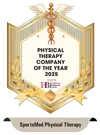What is Golfer’s Elbow?
Golfer’s elbow or pitcher’s elbow, medically known as medial epicondylitis is a repetitive strain injury that affects the muscles and tendons surrounding the elbow. Specifically, this occurs on the inside of your elbow where the forearm flexor attaches called the medial epicondyle.
How Does Golfer’s Elbow Happen?
Golfer’s elbow occurs from the repetitive movements associated with flexion of the forearm to grip or rotate your wrist. This condition is most often associated with golfers or pitchers, hence the name, but can also occur in anyone who reputedly uses their forearm forcefully. Such as in racket sports like tennis or throwing sports, like baseball.
The pain radiates on the inside of the forearm and elbow, and can make it difficult to open doors, lift, flex the wrist,
or shake someone’s hand. Like tennis elbow, it is a form of tendonitis specific to the elbow, however golfer’s elbow is less common and occurs on the inside of the elbow.
What Can I Do To Heal My Golfer’s Elbow?
Usually the condition goes away after a while with rest, and pain can be relieved with the help of a forearm brace. Doctors may prescribe over the counter pain killers, cortisone gels or injections, physical therapy, and in more serious cases surgery. The best way to prevent golfer’s elbow is to stretch and strengthen the muscles in your wrist and forearm. Especially if your profession requires repetitive use of the muscles in the forearm. If at all possible, try to switch hands when doing repetitive motions. While playing sports be sure to learn and use proper technique, and listen to your body when it is time to rest. Also, working and strengthening the muscles in your back, shoulders, and upper arms can also help reduce strain in the lower arms. If you experience pain be sure to see your physical therapist to get a proper diagnosis before starting any type of treatment, and to confirm nothing more serious is occurring.
[footer title=”Have you, or someone you know recently experienced elbow and/or forearm pain? We can help speed up your recovery process!”]



